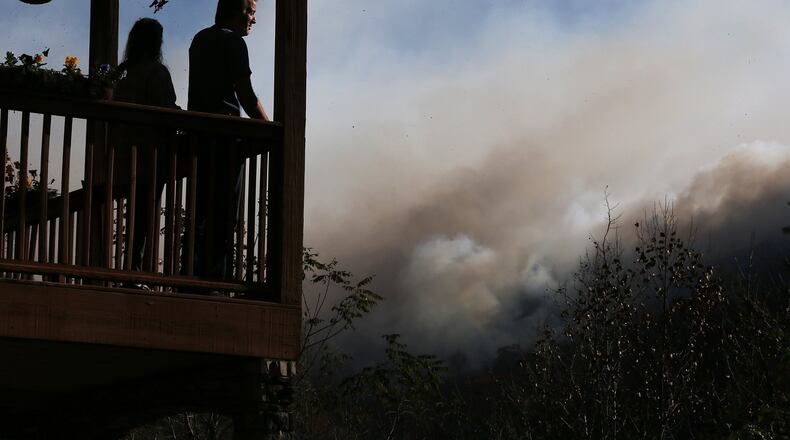Related stories:
The fire crept down Pot Gap Ridge towards the valley below, plumes of white smoke puffing anew every few minutes or so. Helicopters dipped yellow water buckets into a nearby pond before circling up over the Tallulah River, cresting the ridge and dumping their precious cargo onto the marching flames.
Nothing but too-dry trees and a narrow creek stood between Lizzy Falcon’s home and disaster. She puttered about, filling suitcases and boxes with clothes, documents and artwork. No mandatory evacuation had yet been ordered Wednesday of the small, achingly beautiful community of Tate City, wedged between two fingers of the fire. Nobody took any chances, though.
“I have that feeling of imminent doom,” said Falcon, a surrealist painter. “We have a 7,000-acre fire in our backyard and another one burning over there. I almost feel like I’m in the alligator’s mouth and I’m not able to control this beast.”
A welter of emotions — fear, anger, sadness, resignation, pride, cussedness, melancholy— coursed through the remaining residents of this old mining community at the end of the river road hard up against North Carolina.
They watched, some since 5 a.m. when the orange of the flames juxtaposed beautifully with the dark of the hillsides, as the fire inched closer. They waited nervously for the knock on the door telling them to clear out, head for safety before the fires licked wooden frames or the dirt road to safety became impassably clouded by smoke.
Wildfires are not unlike hurricanes. Days of warnings and weather watchings are parsed to determine if the fire is coming your way or, maybe, it’ll veer off and destroy another community. So you watch and wait and pray for rain or a shift in wind, all the while padding about your house crying, packing bags and calming pets.
“We don’t have any children; this is our dream home, our final resting place, though, hopefully later rather than sooner,” said Vebbra Willey, an ultrasound technologist at a Duluth hospital. “I feel such a tightness in my chest. Never in our wildest dreams did we believe this would happen. Or that someone that asinine could deliberately set this fire.”
Betty Jewett, who supervises the Chattahoochee-Oconee National Forest, said Tuesday the now-8,000-acre fire was “intentionally” set. “Multiple little fires,” she said, were started just down Tallulah River road near one of the campgrounds. Investigators are looking for a blue SUV spotted in the area.
It hasn’t rained more than 1/4 of an inch in 40 days, the National Weather Service says. And forecasters say there is no relief on the horizon. The ground is matchstick-dry offering a constant fuel of duff and downed Hemlock trees so the so-called Rock Mountain fire can takes its maddeningly slow crawl over 4,000-foot mountain tops and rhododendron-carpeted river bottoms.
Help streams in. Two hundred firefighters, from Sundance, Utah to Towns County, Georgia, are now battling the blaze which sends smoke southward to Atlanta and Macon. The flames top out at 4 feet. It’s not the wall of fire of Western lore.
But it’s relentless. Fire crews bulldozed a line along Mill Creek which runs into the Tallulah River only to see the fire pop back up the other side of the break. Much of firefighters’ time is spent mopping up hot spots. Wednesday, in Tate City, they cleared brush from utility poles and homes hoping to deny purchase to the approaching flames.
“When you wake up at two or three in the morning and you smell smoke and you see sparks, that really puts it all in perspective,” said Rick Caplano, a law-enforcement retiree married to Falcon. “The fire is coming this way. The fire is coming from that way. And we’re right at the damn apex.”
Tate City isn’t really a city, more an assortment of fancy, second-home homes owned by Atlantans and Floridians and more utilitarian houses for residents working in Clayton or Dillard. Corundum — a type of ruby prized for its use as an abrasive to grind glass and polish metals — was once king and the valley town counted 1,000 residents whose lives revolved around the mine.
There were three schools and as many churches. But the mine closed around the turn of the previous century and logging took over. A fellow named Tate ran the biggest logging camp. Once the hillsides were denuded, the families left. Electricity came late to the valley in the early 1970s.
A sign in town boasts a population of 32, depending on the season. An evangelical, non-denominational church, colorful barns, an old school house turned into the voting precinct serve as the town’s landmarks. But its beauty — a biodiverse, mountainous, trout-fishing gem — tells Tate City’s latterday specialness.
Vebbra and Eric Willey catalogue ginseng, yellow lady’s slipper and large whorled pogonias — rare and wild plants — on their 35-acre spread overlooking the Tallulah River. Theirs is the supposed safe side of the river which should act as a bulwark against the Rock Mountain fire. They built their three-story dream home seven years ago with a wall of windows which now affords them a stunning view of the ever-encroaching fire.
“It’s advanced farther,” Eric Willey said at noon, helicopters dipping and swirling their magic yellow baskets. “It’s a very significant change from this morning. It’s definitely moving faster.”
The wind had shifted, blowing the fire closer. By nightfall, though, no evacuation had been ordered. Another night of waiting and watching the eerie glow of orange against black awaited. Of smoke filling the valley. Of ashes swirling like snowflakes. Of fear and the unknown.
“I’m hoping against hope,” said Vebbra Willey, her breathing labored and her hands reflexively touching her face. “I’m hoping for a fairy tale ending, but at the rate’s this is going, I’m not so sure how it’s going to turn out.”
About the Author
Keep Reading
The Latest
Featured


